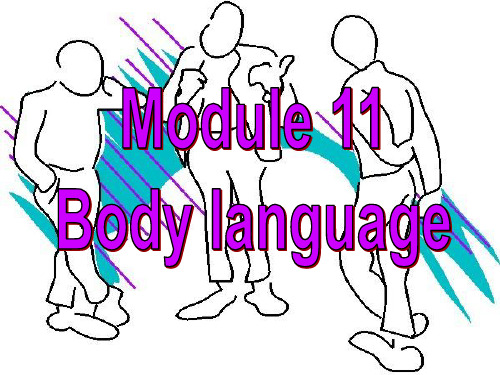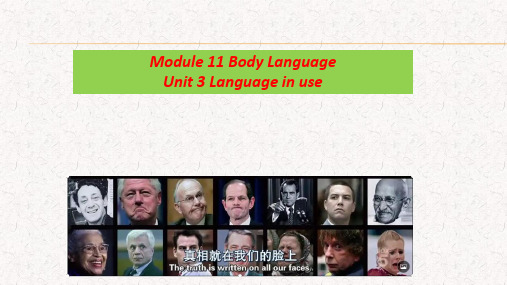外研版七年级下Module11 Unit3课件(共15张PPT)
外研版七年级下册英语Module 11 习题课件 Unit 3 Language in use

D. had
5. Becauseoftheheavyrain, theplanedidn'tarrive_____. C
A. attimes
B.
intime
C. ontime
【点拨】D.考so查me短tim语e辨析。attimes意为“有时”;intime 意为“及时”;ontime意为“准时”;sometime意为 “一段时间”。分析句意可知飞机未能按时到达,用 ontime。
【t点os拨top】ca由rso句rb中ust的eosianrteh可est知ree是t,现he在rai进se行shi时sh,and故. tell加-ing。 Allof________27(they) areusingsignlanguage. wants
【点拨】theanswerto…th意em为“……的答案”。
D. difference
3. ____C____sleeptoolate. It'sbadforyourhealth. A. Can't
B. Notto C. Don't
D. Doesn't
4. It'safinedaytoday. Howabout_______B_apicnic? A. have
一、单项选择
1. ______whenyoucrosstheroad. B
A. Tocare
B. Becareful
C. Tobecareful
D.
Becare
2. TomandTimaretwins, buttheylook_______A_. A. different
B. same C. like
初中英语七年级下册课件:Module11-Unit3 Language in u

Sample Essays
Provide two sample essays, one with strong writing skills and the other with room for improvement, for students to compare and analyze.
Middle School English Grade 7 Volume 2 Courseware
contents
目录
Unit OverviewVocabulary and GrammarListening and Speakingreading comprehensionWriting trainingComprehensive exercises
To foster students' analytical and critical thinking skills by encouraging them to compare and contrast different language examples.
To promote teamwork and cooperation among students through group activities and discussions.
THANKSFOR
感谢您的观看
WATCHING
阅读策略讲解
根据学生水平和兴趣选择合适的阅读材料,激发阅读兴趣,培养阅读习惯。
阅读材料选择
通过多种形式的练习,如选择题、填空题、简答题等,巩固阅读理解和技巧。
阅读练习
引导学生反思阅读过程,发现自己的不足,及时调整阅读策略和方法。
阅读反思与反馈
外研英语七年级下册Module11 Unit3(共15张PPT)

n^od our he^ads
3.Pronunciation语音
Maori Russian India
[ˈmaʊri:] [ˈrʌʃn] ['ɪndɪə]
retell
Countries people do different things when they meet
kiss
smile
nod
hug
touch
people in different countri
do different things
Chinese American Russian
when they meet.
Japanese Indian
Maori
Shake hands and smile
C_h_i_n_e_s_e__p_e_o_p_le_shake hands and smile when they meet.
6. If you meet your friend in New Zealand, what should
you do ? Touch noses
touch noses
listen and read---iii 1. stress 重读
We’re ^going to have some^Russian t^eachers at ^school t^omorrow.
oChtuhtogeur cehFancpohustehosatnhdesr
together
5. Do Indians put their hands together and
nod their heads when they meet?
外研版英语七年级下册课件:Module 11 Unit 3(共36张PPT)

body. finger
mouth
eye
knee
leg
foot
Now, let’s play a game!
Touch your …..
Body language in our life.
We put our thumb up to say “ good”
Walk arm in arm
Wave to say goodbye
PPT素材:/sucai/ PPT图表:/tubiao/ PPT教程: /powerpoint/ 范文下载:/fanwen/ 教案下载:/jiaoan/ PPT课件:/kejian/ 数学课件:/kejian/shu xue/ 美术课件:/kejian/me ishu/ 物理课件:/kejian/wul i/ 生物课件:/kejian/she ngwu/ 历史课件:/kejian/lish i/
课时重点回顾
全世界 肢体语言
中东 私人空间 臂挽臂地 移开/移走 一点也不
around the world body language the Middle East personal space arm in arm move away not at all
5 Work in groups. Talk about your class rules.
Language points
Do you look at people when you talk? In some places, it isn’t polite to look at people when you talk, but in other countries it isn’t polite to look somewhere else. In Britain and the US, people usually look at each other when they talk.
【外研版教材适用】初一七年级下册《Module 11 Unit 3》课件

in line. touch people
when
you
talk
to
them.
✓…
Presentation
Do shake hands when you meet a friend. Do stand in line. Do expect rain. Please talk about the weather. Do Say “please” and “thank you”. Do look at people when you talk
Grammar
Watch your steps. (走路小心。——警告) Look out!Danger! 小心!危险!——强烈警告 Keep off the grass. (勿践草坪。——禁止) No parking. (禁止停车。——禁止) 祈使句也常把主语“You”表达出来,使对方 听起来觉得柔和些,例如:
It’s important to listen to the teacher. Listen to the teacher. You cannot shout in the classroom. Don’t shout in the classroom. 1. It’s important to be careful. 2. It’s important to clean and tidy the lab. 3. You cannot touch anything if the teacher doesn’t ask you to. 4. You cannot bring food or drink into the lab. 5. You cannot enter the lab alone.
Grammar
外研版英语七年级下 Module11 Unit 3 1共30张

Say “please” and “thank you”.
Shake hands.
Be on time .
Ask a woman's age.
Stand too close.
Open doors for others.
Say anything too personal.
Do's Britain
Don'ts
Practice makes perfect.
3 Rewrite the sentences.
1. It's important to be careful.
Be careful. 2. It's important to clean and tidy the lab.
Clean and tidy the lab. 3. You cannot touch anything if the teacher
Practice makes perfect.
challenge
1
2
3
4
5
6
Practice makes perfect.
Guessing Game
Walk onDotDNhnoeoD'tnzospe'nmtaNbTT'rtsroukouamerkyrancpioontnrhl!uokegrrseof!istgc!t!ioanhrgst!!!!
Draw the conclusion ( 得出结论)
祈使句的结构如下: 肯定: (Please) + do sth. / Be + n./adj. 否定: (Please) + Don't do sth ./ No + n.
外研英语七年级下册Module 11Unit3(共28张PPT)

1. It’s important to be careful. Be careful.
2. It’s important to clean and tidy the lab. Clean and tidy the lab.
3. You cannot touch anything if the teacher doesn’t ask you to. Don’t touch anything if the teacher doesn’t ask you to.
2) Does body language mean the same thing in different countries? No, it doesn’t.
3) How do the Russians say hello to each other when they meet? They usually kiss three times.
用于表达叮嘱、希望、命令、请求、劝 告、警告、禁止等的句子叫做祈使句。 Come to my office,please!(请求) Be careful! (叮嘱)
Don't be late again. (劝告/警告) Don't smoke. (禁止)
归纳总结:
1. 祈使句一般没有主语,说话的对象是第二人 称“你”或“你们”,所以也可以理解为省略了主 语you。 2. 以动词原形开头,无时态和数的变化。 3. 祈使句的否定形式是在动词原形前加don't。 4. 在表达请求时,可以加上please; 表达比较强 烈的语气时,可以用感叹号。
an old man in Japan?
A. The old man. B. The young man.
外研版英语七年级下 Module 11 Unit 3(共30张PPT)

Peop_l_e__s_h__a__k_e__h__a__n_d__s__o__r__k_i_s_s__w__h__e_n___t_h_e__y__m__e_ et. Plea_s_e__s_a__y__“_p__l_e_a__s_e_”___a_n__d__“__s_o__r_r_y_”___o_f_t_e_n__.__P__lease be on ti_m__e_,__b__e_c_a__u__s_e__i_t_’s__a___w__a_y___o_f__s_h__o_w__i_n__g__r__e_spect. It's polit_e__t_o__o_p__e_n___d_o__o__r_s__f_o_r__o__t_h_e__r_s_,__b_u__t__i_t_i_s__r_u_ de to ask a woman’s age. _______________________________________________
Module 11 Body Language Unit 3 Language in use
Our body can talk. Can you tell us something from their body language?
Body language is different from culture to culture. So culture shocks(文化冲突) happen often.
Focus on paragraph writing !
Setting: A group of foreign students are coming. They are worried about their manners(礼仪) in China. Please write some advice in a paragrph to help them.
外研版 七年级英语 下册课件 Module11 unit3 Language in use (共

•
11、人总是珍惜为得到。2021/5/10 2021/ 5/1020 21/5/ 10May-2110-May-21
•
Hale Waihona Puke 12、人乱于心,不宽余请。2021/5/ 10202 1/5/10 2021/ 5/10M onday, May 10, 2021
•
13、生气是拿别人做错的事来惩罚自 己。20 21/5/ 10202 1/5/10 2021/ 5/102 021/5/ 105/1 0/202 1
即:Let + 宾语 + 动词原形 + 其它成分)。 如:Let me help you. 让我来帮你。
Task 2:(3mins)
1,翻译并观察以下句子; 2,讨论总结否定的祈使句结构如何?
别担心。
Don't worry .
别问女士年龄。
Don't ask a woman's age .
不要站得太近。
11
Unit 3 Language in use
Crazy English
Don't be afraid of losing face. Don't be afraid of making mistakes. Don't be afraid of practicing English. Don't be afraid of speaking English. Don't be afraid of being laughed at. Don't be afraid of being stared at.
“••tOLhopaoneknkadytoopouer”os.pfoler
外研英语七年级下册Module11Unit3(共19张PPT)

3. The writer writes the passage mainly to _____. [ ] A. introduce the history of bowing in Japan B. describe the purposes of bowing in Japan C. introduce the Japanese custom of bowing D. describe different ways of bowing in Japan
YBoouwshtoupldeobpolew. to people. YDooun'ctans'tatnsdttaonodcltoosoe.close to them.
PLeooopkle alotoekaacth eoatchherot.h..er when Dthoeny'ttaslk.
DYoun'ctawna'vtewtaovseaytobysea.y goodbye.
Be on time .
Don’t stare.(盯着看)
Class rules
Listen to teachers carefully.
…
Don't be late for class.
…
Japanese
bow
1. How do people greet in many countries? [ ]
"excuse me", "good morning", and more.
202X外研版英语七年级下册Module11 Unit3课件

Talk about what do people do when they meet.
In China, people shake hands and smile, sometimes we nod our heads
American people shake hands and sometimes kiss or hug each other
Talk about body language in different
countries.
How close do you stand? How about touching people? Do you look at people when you talk? How do you say goodbye?
“thank you”.
•Stand too
•Open doors for others. close.
•Look at people when •Say anything
you talk.
too personal.
•Be on time.
Around the world
The Japanese bow
Making a poster about body language
Talk about different ways of saying hello and body language in China.
Find some more inforБайду номын сангаасation about body language in some foreign countries.
口诀
下面的口诀总结了祈使句的一般规律。 一起来看看吧!
外研版英语七年级下 Module11 Unit 3 (1)(共30张PPT)

1 Facial expression
2 Posture 3 Gesture
4 other non-verbal signals
In China In America
In India
In Russia In New Zealand In _J_a_p_a_n__
Be a good boy!
Don’t be shy.
Please go upstairs!
Don’t park your car!
help me, please.
Turn left.
Walk on the zebra crossing!
Please don’t eat! Don’t let me see it! No smoking!
Don’t enter the lab alone.
Practice makes perfect.
选择:
1. ______ this kind of peach, and you will like it.
A. To try
B. Trying
C. Try
D. Tried
2.Jack, ________ to be here at 8 o’clock
Practice makes perfect.
用括号内所给动词的恰当形式填空。 1.Please ___o_p_e_n______(open) the door. 2._D__o_n_’t__b_e____(not be) careless. 3.No___t_a_lk__in_g____(talk)! 4.Please _d_o_n_’_t_w__a_tc_h__(not watch) TV so much, Jim! 5.Be ___c_a_r_e_f_u_l___(care)!
外研版英语七年级下册Module11Unit3《Languageinuse》说课稿

外研版英语七年级下册Module 11 Unit 3《Language in use》说课稿一. 教材分析外研版英语七年级下册Module 11 Unit 3《Language in use》的主要内容包括两部分:一是关于电子邮件的阅读和写作,二是关于如何描述图片的阅读和写作。
本节课的内容与学生的生活紧密相连,有利于激发学生的学习兴趣和积极性。
通过本节课的学习,学生能够掌握电子邮件的基本格式和表达方式,提高阅读和写作能力。
二. 学情分析根据对学生的了解,大部分学生在日常生活中已经接触过电子邮件,并对电子邮件有一定的了解。
然而,学生在写作电子邮件时,往往存在表达不清晰、语言不准确等问题。
因此,在教学过程中,需要引导学生注意电子邮件的格式和语言表达,提高学生的写作能力。
三. 说教学目标1.知识目标:学生能够掌握电子邮件的基本格式,正确表达电子邮件的内容。
2.能力目标:学生能够通过阅读和写作电子邮件,提高自己的英语阅读和写作能力。
3.情感目标:学生能够体会到学习英语的乐趣,增强学习英语的信心。
四. 说教学重难点1.重点:电子邮件的基本格式和表达方式。
2.难点:如何准确、清晰地表达电子邮件的内容。
五. 说教学方法与手段1.情景教学法:通过设定情景,让学生在实际情境中学习电子邮件的格式和表达方式。
2.任务型教学法:通过完成具体任务,让学生在实践中提高英语阅读和写作能力。
3.信息技术手段:利用多媒体课件和网络资源,为学生提供丰富的学习素材,提高教学效果。
六. 说教学过程1.导入:通过提问方式,引导学生回顾电子邮件的相关知识,为新课的学习做好铺垫。
2.呈现:教师展示电子邮件的样例,引导学生观察和分析电子邮件的格式和表达方式。
3.实践:学生分组进行电子邮件的写作练习,教师提供指导和反馈。
4.展示:学生展示自己的电子邮件作品,进行评价和交流。
5.总结:教师对本节课的内容进行总结,强调电子邮件的格式和表达要点。
七. 说板书设计板书设计如下:1.电子邮件格式:称呼、正文、结尾、署名、日期2.电子邮件表达要点:清晰、准确、礼貌八. 说教学评价教学评价主要通过以下几个方面进行:1.学生电子邮件作品的质量:内容是否完整、格式是否正确、语言是否准确。
2021外研版七年级英语下册Module11unit3公开课教学课件(共33张PPT)

No, it isn’t. It’s r_u_d__e_ to wave to say
goodbye in Greece.
Don’t wave to say goodbye in Greece.
North America Britain
Greece
Do’s
Don’ts
√Give them Don’t stand
Don’t _e_a_t in class.
run
fight
play sportsliten to musicfriendly polite
classmates teacher
CLASS RULES 1. Don’t be late for class. 2. Don’t run in the classroom. 3. Don’t eat in class. 4. Don’t listen to music in class. 5. Don’t fight. 6. Be polite to the teacher. 7. Be friendly to classmates. …
用于表达命令、请求、劝告、警告、禁止 等的句子。
Structure of imperative sentences
1.Give them more personal space. 2. Look at each other when you talk. 3. Be careful.
1. 主语? 2. 动_词__原_形_开头
They usually __s_h_a_k_e__h_a_n_d_s_a_n_d__s_m_i_le__, and sometimes they _n_o_d__t_h_e_ir__h_e_a_d_s___.
外研版英语七年级下册【单元词汇教学课件】Module 11课件

►一个没有几分诗人气的数学家永远成不了一个完全的数学家。—— 维尔斯特拉斯 ►历史使人贤明,诗造成气质高雅的人,数学使人高尚,自然哲学使人 深沉,道德使人稳重,而伦理学和修辞学则使人善于争论。——培根 ►在现实中,不存在像数学那样有如此多的东西,持续了几千年依然是 确实的如此美好。——苏利文确。 ►宇宙的伟大建筑是现在开始以纯数学家的面目出现了。J·H·京斯 ►新的数学方法和概念,常常比解决数学问题本身更重要。——华罗 庚 ►数学是无穷的科学。――赫尔曼外尔 ►上帝是一位算术家。——雅克比
返回
n. 事实;细节
返回
v. 鞠躬;弯腰
返回
v. 摇晃
握手
返回
Hale Waihona Puke v. 点(头)返回
v. 拥抱;紧抱
返回
v. 触摸;接触
返回
v. 握着;使不动
返回
v. 移动
返回
v. 挥(手);招(手);摆(手)
返回
v. 带来
返回
adj. 外国的
返回
adj. 个人的
返回
adj. 礼貌的
返回
adj. 粗鲁的;无礼的
返回
adv. 一起;共同
返回
adv. 某处;某个地方
返回
pron. 各个;每个
返回
int. 什么(表示惊奇)
返回
v. & n. 吻;亲吻
返回
v. & n. 微笑
返回
n. 德国人;德语 adj. 德国的;德国人的;德语的
返回
n. 日本人;日语 adj. 日本的;日语的;日本人的
返回
►A man is not old as long as he is seeking something. A man is not old until regrets take the place of dreams. 只要一个人还有追求,他就没有老。直到后悔取代了梦想,一个人才 算老。 ►Bad times make a good man. 艰难困苦出能人。 ►Life is a path winding in the mountain, bumpy and zigzagging. 生活是蜿蜒在山中的小径,坎坷不平。
- 1、下载文档前请自行甄别文档内容的完整性,平台不提供额外的编辑、内容补充、找答案等附加服务。
- 2、"仅部分预览"的文档,不可在线预览部分如存在完整性等问题,可反馈申请退款(可完整预览的文档不适用该条件!)。
- 3、如文档侵犯您的权益,请联系客服反馈,我们会尽快为您处理(人工客服工作时间:9:00-18:30)。
5. Is it all right to wave goodbye in Greece? No, it isn’t. 6. How do you usually say goodbye with body language? I wave my hand.
Do’s
Stand in line.
Shake hands.
祈使句
1.用于表达命令、请求、劝告、警告、禁止等的句子。 2.可在句首或句尾加上 please,表示客气。
肯定结构
1. Do 型 (即: 动词原形 + 宾语 + 其它成分)。 如: Please have a seat here. 请这边坐。 有的祈使句在意思明确的情况下, 动词可省略。 如: This way, please. = Go this way, please. 2. Be 型 (即: Be + 表语 (名词或形容词 + 其它成分)。 如: Be a good boy! 要做一个好孩子! Be quiet. 安静。 Be careful! 小心!
Answer the questions with the words and expressions below all right arm in arm close different hold on to kiss three times point at shake hands with wave 1. How do the British say hello to each other when they first meet? They shakes hands with each other. 2. Does body language mean the same thing in different countries? No, it doesn’t. 3. How do the Russians say hello to each other when they meet? They usually kiss three times. 4. Is it polite to stand close to North Americans? No, it isn’t.
For example: It’s important to listen to the teacher.
Listen to the teacher. You cannot shout in the classroom. Don’t shout in the classroom.
1. It’s important to be careful. Be careful. 2. It’s important to clean and tidy the lab.Clean and tidy the lab. 3. You cannot touch anything if the teacher doesn’t ask you to. Don’t touch anything if the teacher doesn’t ask you to. 4. You cannot bring food or drink into the lab. Don’t bring food or drink into the lab. 5. You cannot enter the lab alone. Don’t enter the lab alone.
Be on time.
· Stand in line. · Don’t touch people when you talk to them. ·…
Shake hands when you meet.
· You should shake hands when you meet.
· You have to shake hands when you meet.
· It’s important to shake hands when you meet.
· It’s polite to shake hands when you meet.
Don’t ask a woman’s age.
·You can’t ask a woman’s age. · It’s not polite to ask a woman’s age. ·It’s rude to ask a woman’s age.
Hello, Everyone!来自I’m … Today I’m going to talk about body language in different countries. In China, …
情景剧编演
The Japanese bow thank you “_____”, sorry In Japan, people bow to say “_________”, “________”, “_________”, hello goodbye “_________________”, you’re welcome “___________” excuse me and many other things. Children and young people bow lower when they greet older people. It’s a way ________ of being _____ polite and showing respect __________ .
Don’ts
Touch people. Ask a woman’s age.
Say “please” and “thank you”. Stand too close. Say anything too Look at people when you talk. personal. Open doors for others.
Give them more personal space. 1. _____
2. ______ Wave to say goodbye.
3. _____ Be careful! Don’t stand too close to North 4. ______ Americans.
1. 无主语
2. 动词原形或 don’t 开头
